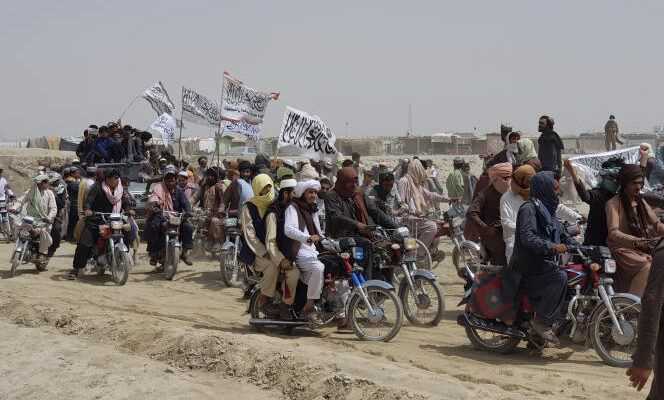The Afghan authorities, faced for two months with a vast Taliban offensive that they are struggling to stop, decreed, Saturday, July 24, a night curfew on the entire territory with the exception of three provinces.
“In order to stem the violence and limit the movements of the Taliban, a curfew is decreed in 31 provinces of the country” which has 34, said the interior ministry in a statement. Only the provinces of Kabul, Panchir in the northeast and Nangarhar in the east are not concerned. Deputy ministry spokesman Ahmad Zia Zia said in a message to reporters that the curfew would be in effect from 10 p.m. to 4 a.m. He did not specify for how long the measure would be applied.
The insurgents launched an all-out offensive against Afghan forces in early May. This push across the country benefits from the final withdrawal of international forces from Afghanistan, now practically complete, most of the 9,500 foreign troops having left the country in the past two months.
The Taliban have seized large rural parts of the country and several important border posts with Iran, Turkmenistan, Tajikistan and Pakistan. The Afghan forces put up little resistance to the offensive and now only control the main roads and the provincial capitals.
American strikes
After three days of relative calm on the ground, on the occasion of Eid el-Adha, the Muslim feast of the Sacrifice, the Afghan authorities have, however, announced the launch of multiple military operations since Friday, in some fifteen provinces. , in an attempt to regain ground from the Taliban. A correspondent for Agence France-Presse reported on Saturday that army operations were underway in the northern province of Kunduz, in an attempt to retake areas fallen to the insurgents.
The defense ministry announced on Friday that the army had taken over an important district of the western province of Herat, bordering Iran. The United States, whose withdrawal of troops is 95% complete, according to the chief of staff of the American army, confirmed, for its part, to have provided air support to the Afghan army, which in sorely missed. “We continue to carry out strikes to support the Afghan forces”, said the spokesman for the US Department of Defense, John Kirby, refusing to specify where and when these strikes were carried out.
The Taliban, for their part, described“Barbarian attacks” those American strikes. They denounced the martial tone of President Ashraf Ghani, who announced major operations of Afghan special forces over the next six months. “During this six-month period, responsibility for any military developments will rest with the leadership of the government in Kabul. The fighters [talibans] will fiercely defend their territories and will not remain in a defensive posture if the enemy insists on waging war ”, warned Zabihullah Mujahid, a spokesperson for the Taliban.
The Taliban seek to modernize their image
This spokesperson strongly denied the accusations of the government which, in recent days, has documented atrocities committed against civilians by the Taliban in the district of Spin Boldak, bordering Pakistan, which they seized on July 14. “We strongly deny such propaganda. After the capture of the Spin Boldak district by the combatants [talibans], nobody was harmed, nobody was mistreated “, he said.
Since Washington announced in 2020 its plan for the final departure of foreign troops from Afghanistan, the Taliban have been trying to display a more modern and moderate image, especially vis-à-vis abroad and claim to be supporters of a “Political agreement” to end the conflict.
Launched in September in Doha, the inter-Afghan talks are, however, at a standstill. A cycle of discussions, again sterile, ended on July 18. The Afghan government and the Taliban accuse each other of being responsible for the failure of the negotiations and of not wanting peace.

Also listen Can the Taliban take back power in Afghanistan?
